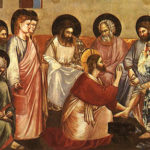We run our website the way we wished the whole internet worked: we provide high quality original content with no ads. We are funded solely by your direct support. Please consider supporting this project.
What About the Contradictions Found in the Gospels?
It’s quite common for people to question the veracity of the Gospels because there are contradictions between them. In fact, an interaction between Steven Colbert and Bart Erhman, a scholar who makes a big deal of these contradictions, has become quite popular. While Colbert’s comedic response is entertaining, we must say more. And Greg has done just that over the years. Here is an excerpt from his book Letters from a Skeptic in response to his dad’s question, “Aren’t the Gospels full of contradictions?”
It is also true that the order of events in all the Gospels varies a great deal, but I again don’t see this as diminishing their credibility. Dad, the Gospels are not trying on every point to just give biographical information on the life of Jesus. They were not written to satisfy historical curiosity. They were written to save people by bringing them into a relationship with the Savior. They are each painting a portrait of the historical Christ—an “impressionistic painting,” if you will—and they rearrange material to fit the theme of their portrait. …
None of this, I argue, diminishes the Gospel’s general reliability. All the historical works of this time period were written in just the same fashion. It only means we can’t know for sure the exact order in which the events of Jesus’ life took place (though a general order is certainly discernable). But what difference could this information make?
The same may be said of the words of Jesus. The Gospels vary a good deal on what exactly Jesus said, and when exactly He said it. But this just shows that the writers were not 20th Century people concerned with the exact wording of things. They paraphrase Jesus in their own words to bring out the meaning which they feel their audience needs to hear. This simply shows how rich the teachings of Jesus were. The Gospels do what no “snapshot/tape recording” account of Jesus could ever do: They bring out the theological and personal significance of His life and teachings for readers. …
Almost all of the alleged “contradictions” in the Gospels are the result of people misusing the Gospels, viz, treating them like 20th century works which work under a “snapshot/tape recording” criteria of truth. But if they are read in accordance with their first-century context and the purpose for which they are written, the “contractions” disappear. Not because they are explained away, but because they instantly become totally irrelevant.
There’s a lot [the Gospels] don’t’ tell us which, perhaps, our historical curiosity would like to know. But they nevertheless tell us all that we need to know and thus force us to answer an all-important question: Who was Jesus Christ? And with this question comes a decision: Was He a lunatic, was He a liar, or was He the Lord His followers proclaimed Him to be? (109-111)
Category: Q&A
Tags: Apologetics, Bible, Jesus, Letters from a Skeptic, Reliability of the Gospels
Topics: Biblical Reliability
Related Reading

Aslan Roars: The Atonement as Spiritual Warfare
Greg begins to unpack the Christus Victor view of the atonement by comparing it to the Chronicles of Narnia.

God is Like a Trojan Horse
Yesterday, I introduced a basic understanding of the Christus Victor view of Christ’s work on the cross. [Click here to read it.] Today, I want to expand on this briefly. Because God is a God of love who gives genuine “say-so” to both angels and humans, God rarely accomplishes his providential plans through coercion. God…

Is God Personal?
Hamed Saber via Compfight How can we trust that God is personally involved in our lives? Are our seemingly “small” lives significant enough for God to get involved when you consider the vastness of all that goes on in the cosmos. These are common question raised by skeptics and seekers. In Letters from a Skeptic,…

What About Violence in the Parables? (podcast)
Greg examines the harsher parables. Episode 524 http://traffic.libsyn.com/askgregboyd/Episode_0524.mp3

Living Incarnationally
The Christian faith is centered on the belief that in Jesus Christ God became a human being. This is commonly referred to as the doctrine of the incarnation. It means that in Jesus, God became embodied. God left the blessed domain of heaven, was born in Bethlehem, and took on our humanity that we might…

God Made Visible
During Advent, we celebrate and bring to the forefront of our imagination the God who was made visible. The Gospel of John sums up the advent of God with one sentence: “And the Word became flesh and lived among us, and we have seen his glory, the glory as of a father’s only son, full…

